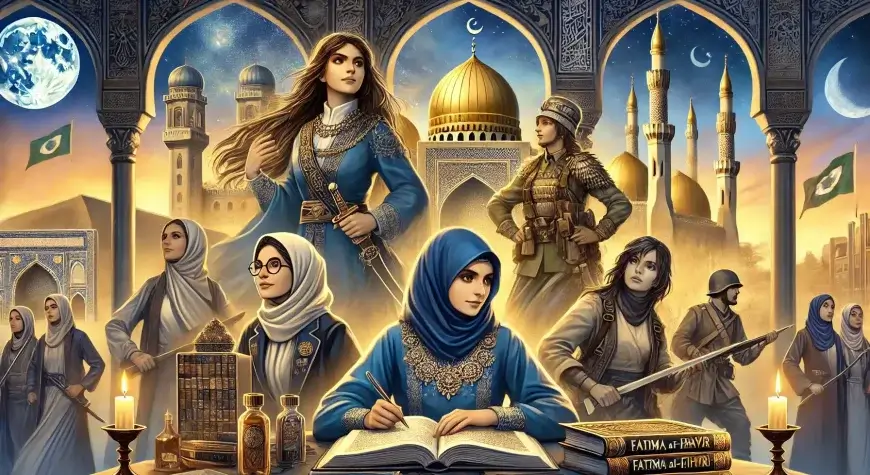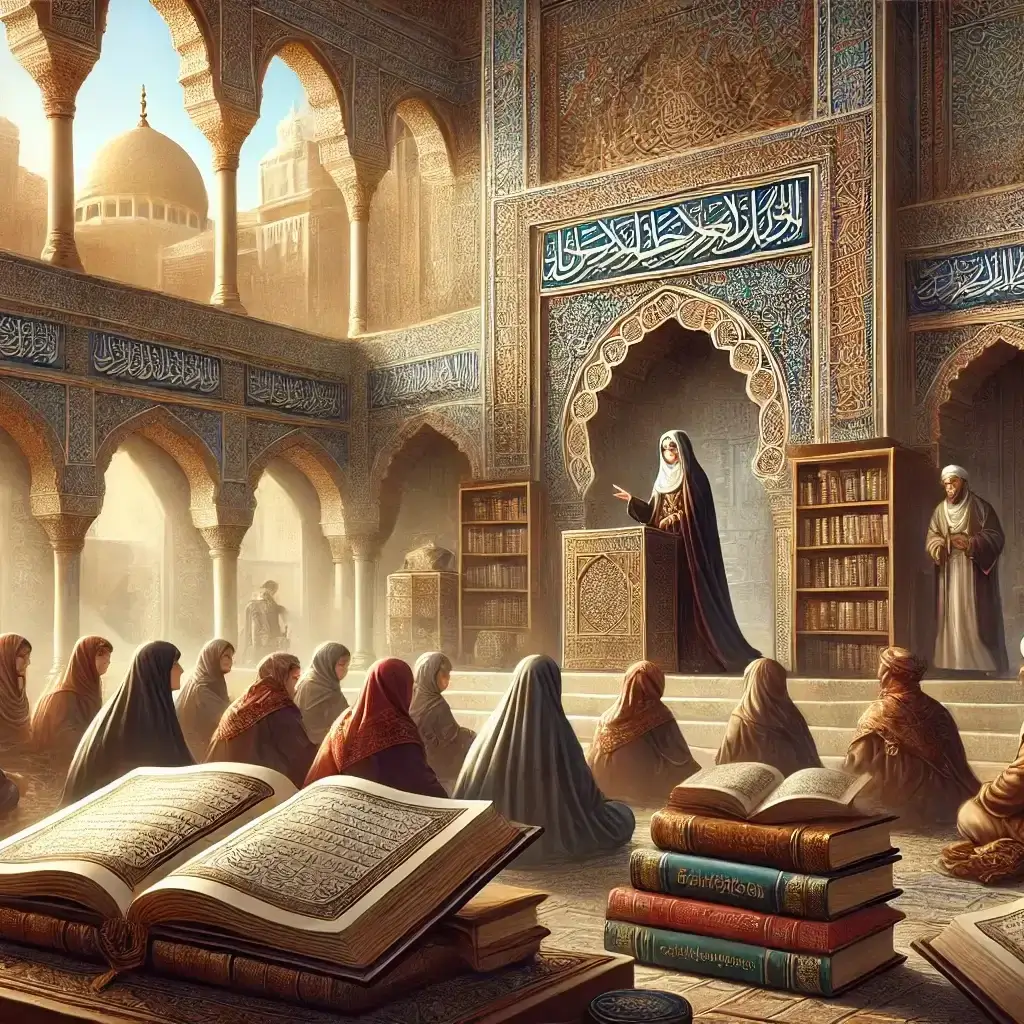The Role of Women in Islam Legacy of Strength and Leadership

A Rich Legacy of Strength, Leadership, and Contribution
Throughout history, the role of women in Islam has often been misunderstood or overshadowed by stereotypes. However, when we look deeper into Islamic history, it becomes clear that women have played pivotal roles in shaping the religious, social, and cultural landscape. From the early days of Islam to modern times, women have contributed to intellectual thought, governance, and even battlefield heroics, challenging the notion that Islam restricts women’s participation in public life. The lives and legacies of these women reflect a complex and rich history that often transcends the barriers imposed by time and culture.
Table of Content:
The Early Years: Women in the Prophet’s Circle
One of the most profound examples of women’s influence in Islamic history comes from the life of the Prophet Muhammad (PBUH) and his immediate family. His first wife, Khadijah bint Khuwaylid, stands out not only for being the Prophet’s first believer but also for her immense contribution to the early spread of Islam. A wealthy and successful businesswoman, Khadijah was the first person to accept Islam and supported the Prophet in his mission with both material and emotional backing. Her courage, intelligence, and unwavering faith made her a role model for women in the Muslim community.
Another key figure from the Prophet’s family is Fatimah al-Zahra, his daughter, who is highly regarded as a symbol of piety, strength, and resilience. Fatimah was a loving mother, a devoted daughter, and an integral figure in the development of early Islamic thought. Her actions and decisions, especially in the wake of her father’s death, have left an indelible mark on the Muslim world. She was a leader in her own right, revered for her role in advocating for justice and her tireless efforts in caring for her family and community.
Women in Early Islamic Society
After the passing of the Prophet, women continued to play important roles in various capacities, from education to leadership. One of the most prominent women during the period following the Prophet’s death was Aisha bint Abi Bakr, his third wife. Aisha’s intellect, political acumen, and contribution to Islamic jurisprudence made her one of the most influential women in Islamic history. Aisha is credited with narrating over 2,000 hadiths (sayings and actions of the Prophet), a body of knowledge that remains integral to Islamic teachings today.
Aisha’s political involvement was also significant. She played an active role in the Battle of the Camel, a key event in early Islamic history that was a direct consequence of the dispute over the leadership of the Muslim community following the assassination of the third caliph, Uthman ibn Affan. Despite the tragedy and turmoil of that battle, Aisha’s participation highlighted the depth of her influence and her determination to protect the interests of the Muslim community. Her presence in such a critical event is a testament to the fact that women were not mere passive participants in early Islamic society but active contributors to its political and theological development.
Women as Scholars and Teachers

As Islam spread across regions, the role of women as intellectual leaders continued to grow. Women were often the primary teachers and transmitters of Islamic knowledge, and many were well-known scholars in their own right. One notable example is Rabi’a al-Adawiyya, a famous mystic from the 8th century, who is considered one of the pioneers of Sufism. Rabi’a’s poetry and teachings emphasized divine love and devotion, and she is still widely respected as one of the most significant figures in Islamic spirituality.
Another remarkable scholar was Fatima al-Fihri, who founded the Al-Qarawiyyin University in Fez, Morocco, in 859 CE. The university is recognized by UNESCO and the Guinness World Records as the oldest existing and continually operating degree-granting university in the world. Fatima’s vision and determination to create an institution that would foster learning and intellectual growth have left a lasting legacy in the world of education.
Women like Rabi’a and Fatima al-Fihri not only made significant contributions in their respective fields but also defied the common narrative that women in Islamic societies were denied access to education and intellectual pursuits. These women were trailblazers who demonstrated that the pursuit of knowledge was not gender-specific and that women had the potential to be powerful intellectual figures.
Women in Governance and Leadership
Throughout Islamic history, women have also played leadership roles in governance, military, and diplomacy. Arwa al-Sulayhi, the Queen of Yemen in the 11th century, is an exemplary figure in this regard. Arwa was not only an effective ruler who maintained political stability in Yemen but also a patron of education and architecture. She ruled with wisdom and grace, balancing the needs of her people with the demands of the times.
In the realm of military leadership, Khawlah bint al-Azwar is a name that commands respect. A warrior and a leader in the early Islamic conquests, Khawlah fought in several battles alongside her brother. Her courage and bravery on the battlefield earned her a place in Islamic military history, demonstrating that women were not only figures of the home but also participants in the defense of their faith and community.
Even in the more contemporary periods, the legacy of women in leadership continues. Figures like Benazir Bhutto, the former Prime Minister of Pakistan, and Ameenah Gurib-Fakim, the former President of Mauritius, represent the continued presence and influence of women in the political arena, demonstrating that leadership is not bound by gender.
Women in the Arts, Literature, and Social Change
Throughout history, Muslim women have also excelled in the arts, literature, and social activism. Zaynab al-Ghazali, an Egyptian Islamic activist, and scholar, is a prime example. Al-Ghazali was known for her efforts in advocating for women’s rights within the Islamic framework, working tirelessly to empower women to be active participants in their society while remaining grounded in Islamic principles. Her efforts to combine spiritual values with social activism set her apart as a significant figure in modern Islamic feminism.
In the arts, the poet Layla al-Akhyaliyya, from the 9th century, is celebrated for her literary contributions, particularly her eloquent Arabic poetry. Her works explored themes of love, loss, and beauty, touching on human emotions in ways that transcended gender norms. Similarly, contemporary Muslim women poets, writers, and filmmakers are shaping the narrative of Islam by producing art that challenges stereotypes and invites new conversations about faith, identity, and the role of women in society.
The legacy of women in Islamic history is one of both challenge and triumph. From the time of the Prophet Muhammad (PBUH) to the modern day, women have been central to the development of Islamic thought, politics, and culture. Despite facing social and political challenges throughout history, many Muslim women have shown extraordinary resilience and have defied conventional expectations, contributing to the growth and enrichment of their communities.
Read More About : Men and Women Equality and Misconceptions
It is crucial to recognize these stories and highlight the women who have been instrumental in shaping the world we know today. By reclaiming the narrative of women in Islamic history, we acknowledge their contributions not just to the Muslim world, but to humanity as a whole.
As we move forward, the role of women in Islam continues to evolve, with countless women around the world making their mark in every field imaginable—whether it be in education, politics, art, or social justice. The future of Islamic history is, and always has been, a story written by both women and men in equal measure.

